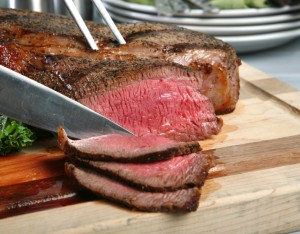A new study presented at the 11th AACR International Conference on Frontiers in Cancer Prevention Research found that protein and iron found in red meat, when combined in the body, form N-nitroso compounds that may increase the risk of bladder cancer. Furthermore, some people have a reduced ability to reverse the effects of those compounds because of a specific gene variation.
 Chelsea Catsburg of the University of Southern California said that, “nitrosamine formation occurs predominantly in the stomach and intestines, so these exposures have been studied extensively in relation to gastric cancer and somewhat in relation to colorectal cancer. However, there is evidence that these reactions also take place in the bladder, particularly in the presence of infection.” Ms. Catsburg is a doctoral student at the Keck School of Medicine.
Chelsea Catsburg of the University of Southern California said that, “nitrosamine formation occurs predominantly in the stomach and intestines, so these exposures have been studied extensively in relation to gastric cancer and somewhat in relation to colorectal cancer. However, there is evidence that these reactions also take place in the bladder, particularly in the presence of infection.” Ms. Catsburg is a doctoral student at the Keck School of Medicine.
Processing and storage of meat increases amine concentration. In the presence of nitrites, they combine to create nitrosamines, which are carcinogenic. Heme iron in red meat increases this formation. The researchers tested 627 single-nucleotide polymorphisms in 27 genes, and data from 355 bladder cancer cases and 409 controls in the Los Angeles Bladder Cancer Study.
A polymorphism in the RAD52 gene reduces the DNA repair activity of the RAD52 protein. The World Cancer REsearch Fund recommends that people limit red meat intake and avoid processed meats to reduce the risk of developing stomach and bowel cancers. Anyone at risk for bladder cancer may want to avoid intake of those meats. Ms. Catsburg added that “further replication of this study to support an association between heme and meat intake and the risk for bladder cancer is necessary.”




